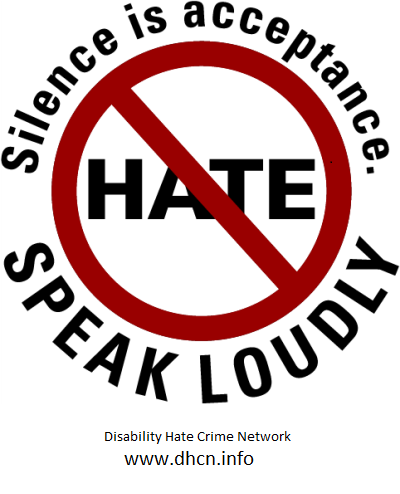s.146 Disability Hate Crime
My name is Alicia Patterson; I’m a disability law specialist, with a particular area of interest within the legislation that surrounds the area of hate crime – in particular disability hate crime. As well as being a voluntary member of the Crown Prosecution Service’s Local Scrutiny Involvement Panel (LSIP) for Lancashire, I’m also a training consultant delivering training based on disability hate crime. I have been asked by the Disability Hate Crime Network to write a piece on the legislation around this offence.
What is s.146 and how is it currently used in law today?
This refers to Section 146 (s.146) of the Criminal Justice Act (CJA2003). When s.146 was introduced in April 2005. it did not bring with any new legislative powers, It is what is known as “a sentencing uplift”, rather than a new stand-alone offence.
What is a “sentencing uplift”?
A sentencing uplift is “time added” to a sentence by the court to a defendant convicted of a crime when they have been found guilty of an offence where s.146 may be applicable. I have taken a keen interest in s.146 and its meanings for a number of years. I am of the opinion that since it came into force in April 2005 it has been very rarely used countrywide. I believe strongly that this is due to s.146 in its current form being difficult for the courts to understand and apply. In my experience that is one of the main reasons why we are not seeing very many DHC cases.
How could s.146 be improved?
I believe that a separate set of guidelines pertaining to Section 146, explaining when it should and should not be used should be issued. I do think that should such guidance be available across all relevant organisations then we might see the hate crime provisions being applied more effectively. Another area where I believe s.146 in its current form is failing, is in the lack of provision for the victims or potential victim(s) of disability hate crime. I feel in compiling this statement it would be wrong not to mention briefly the role police forces currently play in fighting hate crime. In general I think it must be said that the police do a brilliant overall job tackling hate crime in difficult times.
However I do think that one of the fundamental reasons why we’re not seeing many cases reported to the police is because an individual who may have been a victim of hate crime may not feel they are able to approach Police with their situation for a number of reasons. For instance, an individual may deem their particular circumstance “unworthy” of police intervention; or indeed they may choose to share their ordeal with someone else (their support worker, for example).
I am of the view that the police’s approach to disability hate crime has improved over the years since the implementation of s.146 in April 2005. I also have no doubt that disability hate crime will continue to be an upmost priority for some groups for many years to come.
Report by JT Briscoe s.146 (CJA2003) advisor & LSIP Panel Member with Lancashire 12/05/2015 Training Consultant Access Community Training Ltd Southport



Agree wholeheartedly Jamie. The CJS needs to continually review how it implements s146; clear guidelines are important, but they also need to be widely distributed and paid attention to. We also need to push for wider public awareness of s146. We need to be empowering victims to understand their rights and recognising that, as well as punishment for offenders, this is also a legislative tool that can give vital recognition to the experiences of victims and make it clear that targeting somebody because of any aspect of their identity is abhorrent and will not be tolerated.
Hello,
I noticed you have a page on hate crime http://dhcn.info/dhcn/the-use-of-s146/so I wanted to drop you a quick email and tell you about our hate crime reference page which may be of use to your community.
See here – http://www.injuryclaimcoach.com/hate-crimes-injury-guide.html
Perhaps you could include a reference to our guide on your page as well?
Please let me know if you have any questions.
Thanks!
James